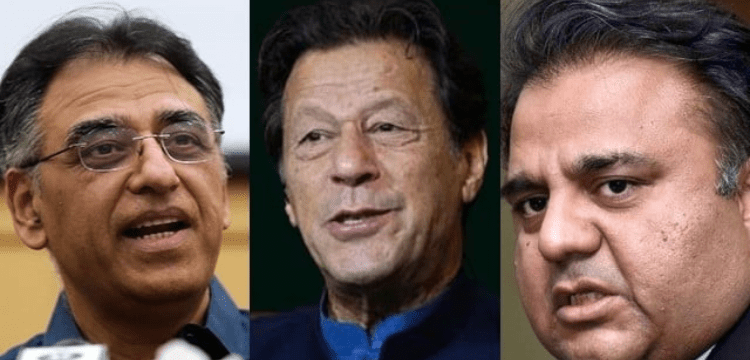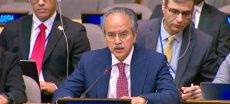[vc_row][vc_column][vc_column_text dp_text_size=”size-4″]Imran is given one final chance by the poll supervisor, while others are facing contempt charges.
ISLAMABAD: Imran Khan, Asad Umar, and Chaudhry Fawad Hussain, the chairman of the Pakistan Tehreek-e-Insaf, were given one final opportunity by the Election Commission of Pakistan (ECP) on Tuesday to appear before it in the contempt proceedings case. The ECP warned the three that arrest warrants would be issued if they disobeyed the order.
The change occurred at the same time as the Supreme Court, in a thorough order, let the poll supervisor to continue its contempt proceedings against the PTI leadership’s top officials without rendering a decision. The contempt case against the PTI leaders was heard by a four-member ECP panel under the direction of Member Sindh Nisar Durrani.
Imran and Fawad’s deputy counsel Syed Ali Bukhari also appeared before the polls oversight board, along with Asad Umar’s attorney Anwar Mansoor. Bukhari said that Imran’s health prevented him from testifying before the ECP, despite the fact that Fawad’s mother was “critically ill” and hospitalised.
He requested the ECP to grant exemption to the two PTI leaders from appearance. Umar’s lawyer maintained that the PTI secretary general did not come because he had missed his flight. Durrani asked Imran’s counsel to present the PTI chief’s medical certificate and pointed out that the case continued since September.
The bench directed that Imran, Umar and Fawad appear before it on January 17, warning that arrest warrants would be issued against them if they failed to follow the order.
In cases involving contempt against the election oversight agency, the Supreme Court has given the Election Commission of Pakistan (ECP) permission to pursue contempt proceedings against PTI Chairman and former prime minister Imran Khan, as well as party leaders Asad Umar and Fawad Chaudhry.
The written order on the ECP appeals was made by a three-member panel that included Justices Athar Minallah and Ayesha Malik and was chaired by Chief Justice of Pakistan Umar Atta Bandial on December 6.
In August and September of last year, the ECP had issued contempt orders to the former premier as well as other party figures including Umar and Fawad for making statements critical of the election supervisor and its head.
The election supervisor had asked the PTI leaders to appear in person or through their lawyers before the commission to explain their position.
However, the PTI members did not appear before the ECP and challenged in high courts the polls supervisory body’s notices and contempt proceedings maintaining that Section 10 of the Elections Act 2017, which is the statutory provision regarding the commission’s power to punish for contempt, was against the Constitution.
The apex court in its written order, maintained that the ECP should continue its contempt proceedings against the PTI leaders and urged the commission to take decision on the objections raised by the former ruling party against the polls supervisor body in accordance with law.
The Supreme Court stated that no high court had stopped the ECP from proceedings, adding that the Sindh and Lahore high courts only stopped the commission from issuing a final verdict. It furthered that the Election Act empowered the ECP to take action.
The SC ruling held that even if the PTI had contested the portion of the law authorizing action, even if it had been challenged, the law’s implementation could not be stopped.
The stay orders issued by the high courts had been contested by the ECP in the supreme court.[/vc_column_text][/vc_column][/vc_row]











